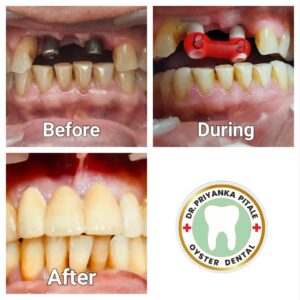
Dental Implants
Dental implants are considered the first line of treatment for the replacement of missing teeth. The brands that are used at Oyster Dental are approved internationally. May it be the replacement of a single tooth or the entire teeth set, implants do play a major role in rehabilitating lost teeth and the function for the long term, while patients are expected to maintain good health.
Dental implants have revolutionized the field of dentistry by providing a long-lasting and natural-looking solution for missing teeth. Unlike traditional dentures or bridges, dental implants are designed to mimic the structure and function of natural teeth, offering superior stability and aesthetics.
The implant itself is a small, screw-like titanium post that is surgically placed into the jawbone, where it acts as an artificial tooth root. This post provides a strong foundation for the attachment of a dental crown, bridge, or denture.
One of the key advantages of dental implants is their ability to fuse with the jawbone through a process called OSSEOINTEGRATION. This creates a secure and stable bond that not only supports the artificial tooth but also helps to maintain the integrity of the jawbone.
When a tooth is lost, the surrounding bone can begin to deteriorate over time due to lack of stimulation. Dental implants provide the necessary stimulation to preserve bone density and prevent further bone loss, which is a common issue with traditional dentures.
The process of getting dental implants typically involves several stages. Initially, a thorough evaluation is conducted to assess the patient’s oral health and determine if they are a suitable candidate for implants. This may include X-rays, CT scans, and impressions of the teeth and jaw. Once the treatment plan is established, the implant is surgically placed into the jawbone.
This is followed by a healing period of several months during which osseointegration occurs. After the implant has fully integrated with the bone, an abutment is attached to the implant, which serves as a connector for the final restoration. Finally, a custom-made crown, bridge, or denture is placed on the abutment, completing the procedure.

Dental implants offer numerous benefits beyond their natural appearance and stability. They enhance chewing efficiency, allowing patients to enjoy a wide variety of foods without discomfort or restriction. Additionally, implants do not require the alteration of adjacent teeth, as is necessary with traditional bridges. This preserves the natural tooth structure and promotes overall oral health. Implants are also known for their durability; with proper care and maintenance, they can last a lifetime.
However, it is essential to note that dental implants may not be suitable for everyone. Certain medical conditions, insufficient bone density, or poor oral hygiene can affect the success of the procedure. It is crucial to consult with a qualified dental professional to determine the best treatment option based on individual needs and circumstances.
In conclusion, dental implants have become the gold standard for tooth replacement, offering a reliable and aesthetically pleasing solution for those with missing teeth. By restoring both function and appearance, dental implants contribute to improved quality of life and self-confidence for many individuals.